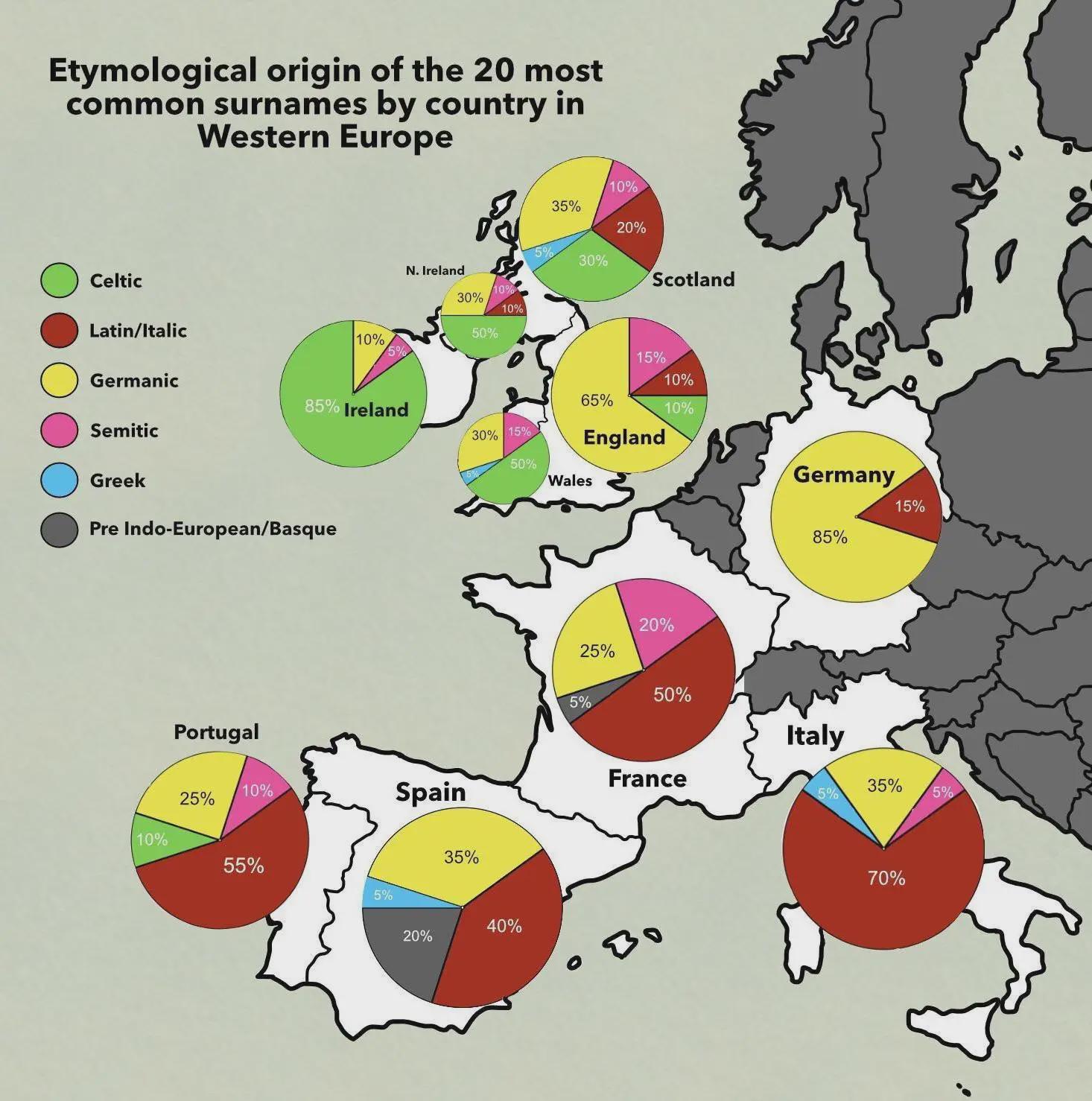Etymological Origin of Common Surnames Map


David Chen
Data Visualization Specialist
David Chen is an expert in transforming complex geographic datasets into compelling visual narratives. He combines his background in computer science ...
Geographic Analysis
What This Map Shows
The "Etymological Origin of the 20 Most Common Surnames by Country in Western Europe" map provides an intriguing glimpse into the linguistic heritage embedded in surnames across various nations. Each country's most prevalent surnames are not merely labels; they reveal a tapestry of historical influences, migrations, and cultural identities. As you look at this map, it becomes clear that surnames are more than just family identifiers; they are narratives of lineage and history that have evolved over centuries.
Deep Dive into Surnames and Their Origins
Surnames often carry with them the weight of history, reflecting the social structures, occupations, and geographical origins of those who bear them. In Western Europe, surnames typically fall into several categories based on their etymological roots. For instance, many surnames derive from occupations, such as 'Smith' in English, which indicates a blacksmith, or 'Fischer' in German, meaning fisherman. These occupational surnames were often given to individuals based on their trade, effectively linking a person’s identity to their profession.
Interestingly, geographical surnames are also prevalent. Names like 'Hill,' 'Brooks,' or 'Woods' in English-speaking countries often denote a person’s place of residence or origin. This reflects a time when communities were much smaller, and people were identified by their local landmarks. In contrast, patronymic surnames, which are derived from a father’s name, are particularly common in Scandinavian countries. Names like 'Johansson' or 'Olsen' carry the meaning of 'son of Johan' or 'son of Ole,' respectively.
Moreover, the map showcases how surnames can act as linguistic markers, indicating the historical migrations and conquests that shaped Western Europe. For example, the prevalence of the surname 'Martinez' in Spain points to a common Iberian practice of using the suffix '-ez' to indicate ‘son of,’ which is rooted in the region's linguistic history. Similarly, in France, the surname 'Dupont' translates to 'of the bridge,' linking it to the geographical features of the land where families first settled.
What’s fascinating is the intermingling of cultures reflected in surnames. In regions like Belgium and Switzerland, you’ll find a rich blend of French, German, and Dutch surnames, indicative of the complex histories of these countries. The evolution of surnames often mirrors the political and social changes in Europe, such as the merging of different states or the impacts of wars.
Regional Analysis
When analyzing the map regionally, distinct patterns emerge. In France, for instance, surnames like 'Martin' and 'Bernard' dominate, reflecting the country's historical Christian influence. In contrast, in the United Kingdom, surnames such as 'Jones' and 'Smith' exhibit the strong Anglo-Saxon roots of the population, showcasing the prevalence of Old English and Norse influences.
Countries like Spain and Italy highlight the importance of regional dialects and languages. In Spain, surnames often carry the suffixes '-ez' or '-es,' indicating lineage, while Italian surnames frequently reveal regional origins, such as 'Rossi' in Northern Italy, which means 'red' and may refer to a person’s hair color or complexion.
Interestingly, the map also highlights the influence of immigration patterns, particularly in countries like the UK, where the last century has seen a significant increase in multiculturalism. Names like 'Patel' point to the Indian diaspora, illustrating how the migration of people influences the cultural fabric of a nation and its naming conventions.
Significance and Impact
Understanding the etymological origins of surnames is more than a mere academic interest; it has real-world implications. For genealogists and those interested in family history, surnames serve as essential clues in tracing ancestry and lineage. The study of surnames can also provide insights into the social hierarchies of the past, revealing how certain names may carry prestige or stigma based on historical contexts.
Furthermore, as globalization continues to shape interactions across the globe, the evolution of surnames may reflect larger societal trends. As communities become more intertwined, new surnames may emerge, and traditional names may evolve, blending cultures in unique ways. The ongoing changes in naming conventions may even influence how we perceive identity in the future.
In conclusion, the map of the etymological origins of common surnames in Western Europe opens a window into the past, revealing not just who we are but where we come from. It provides a fascinating intersection of language, history, and culture that continues to evolve as the world changes around us.
Visualization Details
- Published
- August 22, 2025
- Views
- 162
Comments
Loading comments...